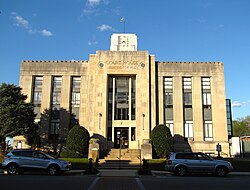Winchester, Tennessee
| Winchester, Tennessee | |
|---|---|
| City | |

Franklin County Courthouse in Winchester
|
|
 Location of Winchester, Tennessee |
|
| Coordinates: 35°11′18″N 86°6′45″W / 35.18833°N 86.11250°WCoordinates: 35°11′18″N 86°6′45″W / 35.18833°N 86.11250°W | |
| Country | United States |
| State | Tennessee |
| County | Franklin |
| Established | 1810 |
| Incorporated |
1821 |
| Named for | James Winchester |
| Area | |
| • Total | 11.7 sq mi (30.3 km2) |
| • Land | 10.7 sq mi (27.8 km2) |
| • Water | 1.0 sq mi (2.6 km2) |
| Elevation | 978 ft (298 m) |
| Population (2010) | |
| • Total | 8,530 |
| • Estimate (2015) | 8,539 |
| • Density | 797/sq mi (307.7/km2) |
| Time zone | Central (CST) (UTC-6) |
| • Summer (DST) | CDT (UTC-5) |
| ZIP code | 37398 |
| Area code(s) | 931 |
| FIPS code | 47-81080 |
| GNIS feature ID | 1274848 |
| Website | www |
1821
Winchester is a city in and the county seat of Franklin County, Tennessee, United States. It is part of the Tullahoma, Tennessee Micropolitan Statistical Area.
The population of Winchester as of the 2010 census was 8,530, showing an increase of 1,201 from 2000.
Winchester was created as the seat of justice for Franklin County by act of the Tennessee Legislature on November 22, 1809, and was laid out the following year. The town is named for James Winchester, a soldier in the American Revolution, first Speaker of the Tennessee Legislature, and a brigadier general in the War of 1812.
Mary Sharp College (originally the "Tennessee and Alabama Female Institute", but later renamed in honor of Mary Corn Sharp, a donor) was founded in 1851 by Dr. Z. C. Graves and the Baptist Church. Though a women's college, it offered a classical curriculum based upon what was being offered at the time by Amherst College, Brown University, and the University of Virginia. It closed in 1896. During the 19th century, the institution helped make Winchester an educational center. Other private schools in the city were Carrick Academy for male students (founded in 1809), Winchester Female Academy (founded in 1835), and Winchester Normal College.
The city was occupied first by Confederate and then by Union troops during the Civil War. Winchester, along with the rest of Franklin County, seceded from the Union several months before the rest of Tennessee, unofficially becoming a part of Alabama until the rest of the state seceded. It lay on the line of retreat to Chattanooga followed by the Confederate Army of Tennessee during the campaign of 1863.
...
Wikipedia
